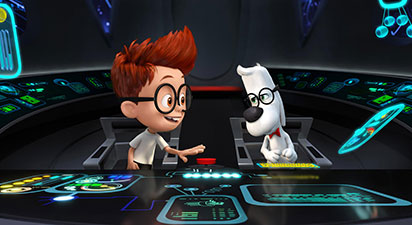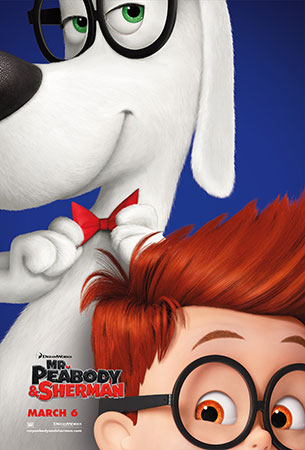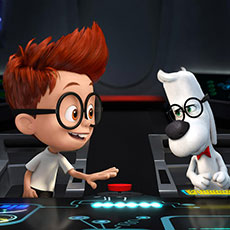Mr. Peabody is the world’s smartest dog — and maybe the world’s smartest being period! But being so far advanced from everyone around you can be lonely. So Peabody decides to adopt a boy named Sherman. And what better way to educate a boy than through time travel! As every parent learns, eventually you have to let the child spread their wings and explore the world without you. And that starts with the first day of school. But when a bully mocks Sherman’s unconventianal family it starts a chain of events that might end with both of them losing the thing most important to them — each other.
 Time travel stories can be difficult to do right because it’s easy to fall into several traps when writing them. Mr. Peabody and Sherman falls into three of them. First off, the film is very episodic. As the characters travel to different time periods, they interact with the people they meet and help them with a problem that needs solved — and then move on to the next. Secondly, the writers doesn’t seem to have established any “rules” for time travel in this world and so they just do whatever is the most convenient for each piece of the story. A character gets separated from the time machine and is stuck in the past? No problem! Two versions of a character in the same place at the same time — how do we get back to a single version? Easy! Oops, we’ve gone back to an earlier point in the movie and changed what happens — doesn’t that effect the timeline? Timeline, shmimelime! And lastly, rather than using time travel as a mechanism to move characters in a story, time travel becomes the story itself. In this film, the writers don’t seem to have come up with a third act so instead use a random time travel issue to give themselves a big finale, though it’s connection to the rest of the story is almost nonexistent and contrived.
Time travel stories can be difficult to do right because it’s easy to fall into several traps when writing them. Mr. Peabody and Sherman falls into three of them. First off, the film is very episodic. As the characters travel to different time periods, they interact with the people they meet and help them with a problem that needs solved — and then move on to the next. Secondly, the writers doesn’t seem to have established any “rules” for time travel in this world and so they just do whatever is the most convenient for each piece of the story. A character gets separated from the time machine and is stuck in the past? No problem! Two versions of a character in the same place at the same time — how do we get back to a single version? Easy! Oops, we’ve gone back to an earlier point in the movie and changed what happens — doesn’t that effect the timeline? Timeline, shmimelime! And lastly, rather than using time travel as a mechanism to move characters in a story, time travel becomes the story itself. In this film, the writers don’t seem to have come up with a third act so instead use a random time travel issue to give themselves a big finale, though it’s connection to the rest of the story is almost nonexistent and contrived.
But unlike the TV show, the movie is not really about time travel or the people they meet. It focuses more on the relationship between Peabody and Sherman. And in this aspect of the story they got more right than wrong. And for a film about a super-genius talking dog and his adopted boy the writers are to be commended for digging into so many real issues parents and their children face. In the course of the movie some of the things they have to deal with include: letting go on the first day of school, people mocking your family for being different, getting in trouble at school, bullying, the potential of having your child removed from your care, discovering girls, and letting the child prove himself capable of not always needing you. Surprisingly weighty stuff about the life of a parent for a movie aimed at kids.
It’s great to have that weight but you want to balance it with humor as well. And in that regard Peabody utterly fails. The movie was just not funny. I barely laughed the entire time and the theatre full of kids behind me barely made a peep. Joke after joke fell flat. And while it’s nice they kept Mr. Peabody spouting puns, most of them were just terrible! No where near as good as the original show. Unfortunately, the filmmakers must have felt that too and went to that old comedy fallback — a heaping dose of the lowbrow. Peabody is filled with the now standard supply of bodily function gags, childish quips (“You said booby”), and, in what may be a new low for crude humor in an animated film, a masturbation joke.
 The art side is up to DreamWorks usual standard: bright colors, cool character designs, fun animation. The different locales the time travelers visit really give the animators a chance to shine. Despite the story issues, the kids will love just looking at this film. In what might be a first for DreamWorks if I’m not mistaken, the company had to take established animated characters and reinvent them for modern audiences. While no one could improve on the classic versions, the updated look is well done and probably just the right amount of being faithful to the originals without being slavish to them.
The art side is up to DreamWorks usual standard: bright colors, cool character designs, fun animation. The different locales the time travelers visit really give the animators a chance to shine. Despite the story issues, the kids will love just looking at this film. In what might be a first for DreamWorks if I’m not mistaken, the company had to take established animated characters and reinvent them for modern audiences. While no one could improve on the classic versions, the updated look is well done and probably just the right amount of being faithful to the originals without being slavish to them.
Outside of Frozen, I haven’t been impressed with the music in most recent animated movies lately. But Danny Elfman did a good job here, in a much more understated way than his usual fare.
The voice acting in the film was pretty good. It took some time for Ty Burrell’s Peabody to grow on me, but in the end I think he did a great job. Max Charles’ Sherman was a little too childlike for my taste, but was otherwise fine. Ariel Winter was perfect as his bullying nemesis Penny. Among the rest of the cast, Stephen Colbert and Leslie Mann stood out as the Peterson’s. Lauri Fraser, Guillaume Aretos, and Stanley Tucci were a lot of fun as Marie Antoinette, Robespierre, and Leonardo da Vinci. And while I’m a huge fan of Patrick Warburton, his distinctive voice is becoming a little too used in animated films.
If you’re a fan of the classic series, you’re going to be disappointed with Mr. Peabody and Sherman. While we can’t fault the filmmakers for their decision to make the focus of the movie the relationship between the two (what worked in short TV episodes probably wouldn’t have translated to a feature film well), their execution is fair game. It was nice to see a parent/child relationship explored in a film for kids and their parents. But the failings in the overall story and humor departments make this a dreary outing that it’s improbable you’ll want to see again.
 | Mr. Peabody and Sherman DreamWorks Animation March 7, 2014 92 minutes Rated PG directed by Rob Minkoff | |











